Taxi for Tobruk Blu-ray Movie
HomeTaxi for Tobruk Blu-ray Movie 
Un Taxi pour TobroukOlive Films | 1960 | 95 min | Not rated | Oct 30, 2012
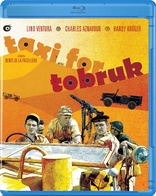
Movie rating
7.4 | / 10 |
Blu-ray rating
| Users | 4.5 | |
| Reviewer | 4.0 | |
| Overall | 4.0 |
Overview
Taxi for Tobruk (1960)
Starring: Hardy Krüger, Lino Ventura, Maurice Biraud, Charles Aznavour, Germán CobosDirector: Denys de la Patellière
| Foreign | Uncertain |
| War | Uncertain |
| Drama | Uncertain |
Specifications
Video
Video codec: MPEG-4 AVC
Video resolution: 1080p
Aspect ratio: 2.36:1
Original aspect ratio: 2.35:1
Audio
French: DTS-HD Master Audio Mono
Subtitles
English
Discs
25GB Blu-ray Disc
Single disc (1 BD)
Playback
Region A, B (C untested)
Review
Rating summary
| Movie | 4.0 | |
| Video | 4.0 | |
| Audio | 4.0 | |
| Extras | 1.0 | |
| Overall | 4.0 |
Taxi for Tobruk Blu-ray Movie Review
All's fare in love and war.
Reviewed by Jeffrey Kauffman October 29, 2012Libya is much in the news these days, what with the recent tragic attack which killed four Americans. Suddenly names like Tripoli and Benghazi are commonplace, even if many Americans frankly probably wouldn’t be able to locate Libya on a map if they were asked to. For decades Libya for most Westerners was probably little more than “that place Ghaddafi was the dictator”. But in World War II Libya was often front page news, especially in one of the early decisive battles for the port city of Tobruk in 1941, but on and off again throughout the duration of the conflict (something that was “immortalized” more or less in the fitfully entertaining 1967 Arthur Hiller film Tobruk). The German forces had routed North Africa and the battles to displace them were long, dangerous and often hampered by logistical difficulties that helped redefine some aspects of modern warfare. (My late father was a Battalion Commander under Patton and fought the North African campaign and frequently joked that he was still shaking sand out of his shoes decades later.) The Libyan desert may not have seen the massive battles that, say, Morocco did, but skirmishes abounded and one of them sets up the major plot device of the 1960 French film Taxi for Tobruk (Un Taxi pour Tobrouk). As the credits introduce us to the major players in the film, we get a little back story on all of them, but once the credits have finished, we segue forward almost a year to a German outpost in Libya where French commandoes are about to attack. They succeed in blowing up the installation, but in the resulting firefight they’re left without transportation, stranded literally in the middle of nowhere. The rest of the film becomes their “road trip” (without any real roads, needless to say) to get to a safe haven, with several unexpected twists and turns (and dunes) along the way.
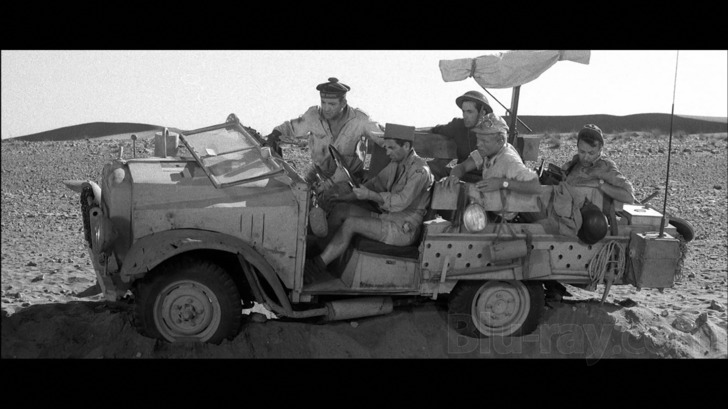
Jean Renoir’s great classic La Grande Illusion (Grand Illusion) is one of the most cogent analyses of the interrelationships between men fighting a war and how those of similar backgrounds tended to bond despite being on opposite sides of the battle. Renoir’s thesis that class somehow overrode nationality caused considerable controversy when the film was first released, but it seems like a fairly “obvious” conclusion to modern day eyes. Renoir’s film has long been held as the touchstone of a portrayal of the camaraderie of those involved in battle (even though rather ironically there’s very little actual warfare in the film), but some may want to include this Denys de la Patellière outing in any short list of insightful examinations about shifting interpersonal alliances between so-called combatants.
The main characters in Taxi for Tobruk are four French soldiers, Brigadier Theo Dumas (Lino Ventura), Jewish medic Samuel Goldmann (Charles Aznavour), François Gensac (Maurice Biraud) and Jean Ramirez (German Cobos). The four manage to get away from the German encampment relatively unscathed, but soon end literally stumbling through the vast and seemingly impenetrable Libyan desert. Just when all seems hopeless, they come upon a small group of Germans. The French manage to take out all of the Germans save for their Captain, Ludwig von Stegel (Hardy Krüger). They take von Stegel prisoner and then purloin the Germans’ truck, heading off for El Alamein, where the French feel positive they can reunite with Allied forces.
The rest of the film works on several levels simultaneously. There is the adventure aspect, as the group tries against great odds to get to safety. One of the film’s tensest sequences finds the French driving into a large German encampment in order to get supplies. Von Stegel lies ill in the rear of the truck and not all of the French speak German. It’s a terrifically staged and acted sequence that will certainly cause sweaty palms in most viewers. Later, there’s another equally anxious moment when the group realizes they’ve wandered into a minefield—with at least two of their numbers already out of the truck and dangerously near trip wires.
Playing out alongside those kind of adrenaline rushes are brilliant character beats that show the French fighting among themselves and all of them in their own way coming to a new understanding about their German “prisoner” (von Stegel’s status changes rather dramatically at least a couple of times in the film). This is where Taxi for Tobruk really rises above many (maybe even most) other war films. The dialogue (by the great Michel Audiard) is both incredibly funny and pointed at times, easily pointing out the absolute madness of war and especially of “choosing sides” when you’re stranded in the desert without much hope of survival.
Performances are very sharp all the way around throughout this film, with some extremely well modulated if at times slightly cryptic or at least oblique if you're not paying attention. Audiard doesn't lay everything out right on the table and the actors need to reveal some subtext when the dialogue is ostensibly about something else. Aznavour is especailly good in this regard as his character's status as a Jew around a German is obviously inherently problematic.
Taxi for Tobruk is probably least effective in its none too subtle jabs at the inanity of war, especially in the film’s closing moments which are slathered in an unneeded tragic ambience that may have roused French audiences in 1960 but which now seem positively bathetic. Much better are the smaller moments in this film, the fascinating interplay between this quintet of strange bedfellows, as well as the extremely exciting set pieces. Watching a disparate group of strangers struggle to stay alive became a staple of the disaster genre a decade or more after Taxi for Tobruk premiered, but making that struggle for survival part of an epochal conflict only makes it all the more visceral and impactful.
Taxi for Tobruk Blu-ray Movie, Video Quality 
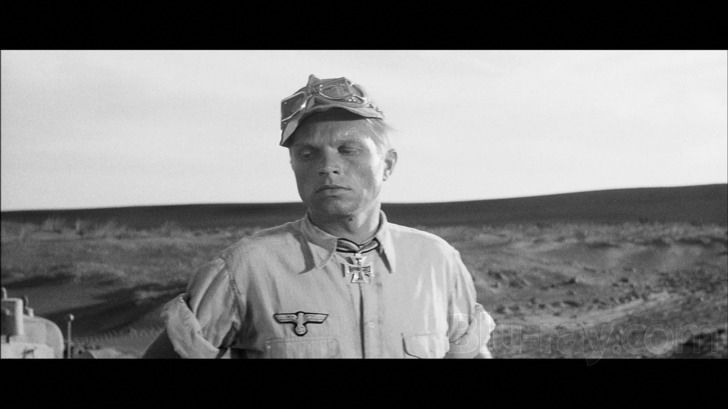
Taxi for Tobruk is presented on Blu-ray courtesy of Olive Films with an AVC encoded 1080p transfer in 2.36:1. The fact that this is a slightly different aspect ratio only confirms my hunch that this is not the same transfer as the one reviewed by my colleague Dr. Svet Atanasov here. This is certainly one of the sharpest looking black and white features yet offered by Olive, one which has near impeccable contrast, making this film, which is awash in shades of white, bristle with great detail and clarity. The film has its share of opticals, especially with long shots coming in and out of fades, and those do show a rather large amount of added grain (as should be expected), but overall this is a remarkably clear and brilliant transfer. The film's close-ups offer abundant fine detail, and the few dark scenes (notably the opening battle sequence which takes place at night) feature excellent shadow detail.
Taxi for Tobruk Blu-ray Movie, Audio Quality 
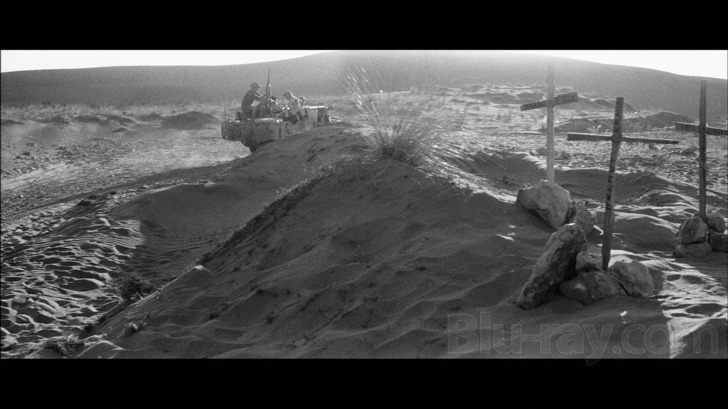
Taxi for Tobruk features a lossless DTS-HD Master Audio Mono track that shows its age but is relatively robust, all things considered. The opening battle sequence reveals a perhaps surprisingly full low frequency range, with some very forceful explosions that help create some sonic energy. The bulk of the rest of the film is then filled mostly with dialogue and the barren sounds of the desert, which frequently include wind whipping through the sands. There are some very minor synch problems a time or two which I assume have been with the film from its theatrical exhibition and are probably traceable to post-looping issues. Fidelity is fine, if not overwhelming, and while dynamic range is subdued simply due to the nature of the film, when something bombastic happens, it's rather well rendered on this lossless track.
Taxi for Tobruk Blu-ray Movie, Special Features and Extras 
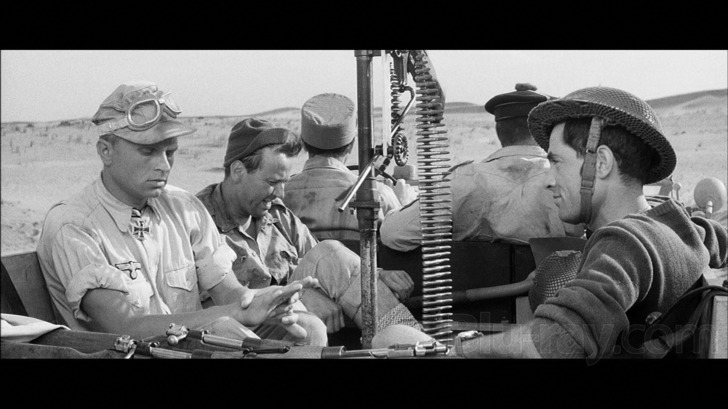
- Special Feature (HD; 5:59) is an untitled promo piece in French which may have been an extended trailer for the film (the final sequence is in fact a traditional trailer), but which features interviews with the source novel's author René Havard, s.creenwriter Michel Audiard and director Denys de la Patiellière.
Taxi for Tobruk Blu-ray Movie, Overall Score and Recommendation 
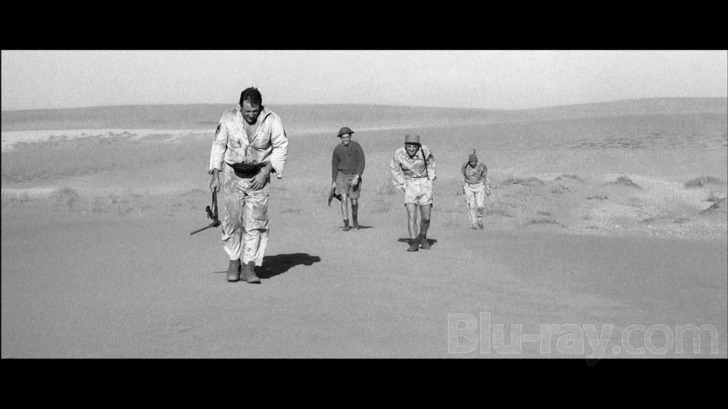
Taxi for Tobruk has rather strangely been an underappreciated gem in the many decades since its release. It is certainly head and shoulders above a glut of other well meaning war films, and its rather brilliant handling of the interrelationships between these five characters is quite unique and at times incredibly forceful. Rarely has dialogue so expertly toed the line between humor and aggression, and there are several wonderful barbs that are thrown as the quintet moves through the endless Libyan desert. If you've never seen Taxi for Tobruk, you're in for a real treat. If you have seen it, you know what's in store but will still be delighted by this Blu-ray's excellent video quality and very good audio. Highly recommended.
Similar titles
Similar titles you might also like

Stalingrad
1993

Touki Bouki
1973

Capital
Le capital
2012

Code Unknown
Code inconnu: Récit incomplet de divers voyages
2000

Babette's Feast
Babettes gæstebud
1987

The Class
Entre les murs
2008

The Front Line
고지전 / Go-ji-jeon
2011

Le Petit Soldat
The Little Soldier
1963

White Material
2009

Battle of the Warriors
墨攻 / Battle of Wits / Battle of Kingdoms
2006

Forbidden Games
Jeux interdits
1952

Beanpole
Дылда / Dylda
2019

My Way
마이웨이 / Mai Wei
2011

White Vengeance
鴻門宴
2011

Le silence de la mer
The Silence of the Sea
1949

Dheepan
2015

La Bête Humaine
1938

The Past
Le Passé
2013

Diva
1981

The Last Metro
Le dernier métro
1980